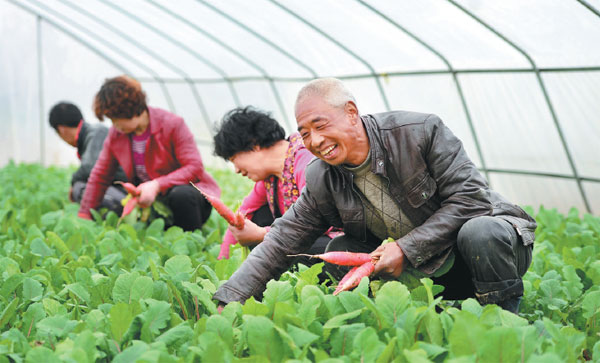
Liu Xiaoyang, a vegetable farmer in Chengxian, Gansu province, works in his greenhouse alongside fellow villagers. Zhang Meng/Xinhua
A raft of measures has been introduced to raise living standards in the remote, mountainous area.
A bright smile played across Fang Najia's tanned, wrinkled face as she explained the measures being taken to help her family escape the poverty trap.
The 50-something from Yawan, a village in Gongchang county in the south of Gansu, one of China's poorest provinces, is one of millions of beneficiaries of a poverty-alleviation program that began in 2013.
Few outsiders would describe Fang's family of four, whose details were entered in a poverty database last year, as impoverished. Unlike their less-prosperous neighbors, the family's courtyard contains three straw-and-mud houses, but as average villagers their combined income is only about 3,000 yuan ($450) a month.
While that's just about enough to live on, it isn't enough to lift the burden of the 8,000 yuan Feng's daughter has to pay every year to attend a university in the eastern province of Jiangxi.
After Gongchang's leaders had collected information about the situations of households across the county to compile the poverty database, Fang's family was deemed eligible to receive aid from a program designed to help people who are being pushed into poverty by the cost of higher education, or through illness and disability.
Under the program, Fang's daughter is permitted to collect an annual loan of 10,000 yuan from a special education aid program operated by the county government. The loan, which will be interest free until she graduates and starts work, means she can continue her studies.
For their part, Fang and her husband can claim a low-interest, five-year loan of 50,000 yuan. If they invest the money in a mushroom-cultivation project in the village, the family will receive 4,000 yuan at the end of the year. When the contract expires, the family can repay the original sum, plus a small amount of interest, and arrange another loan. Together, the programs account for 15 percent of the county's annual budget.


















































